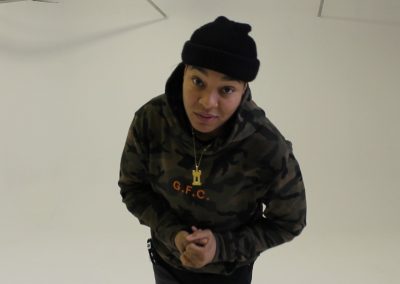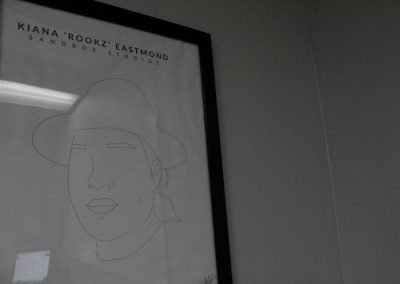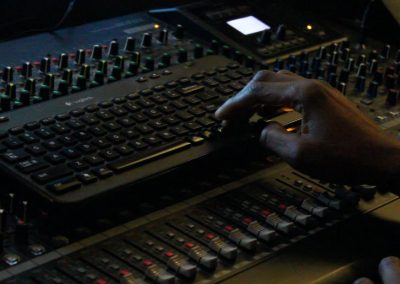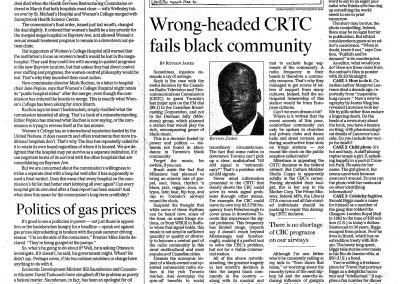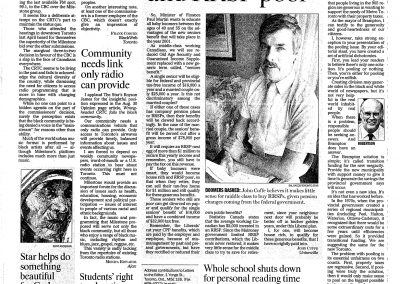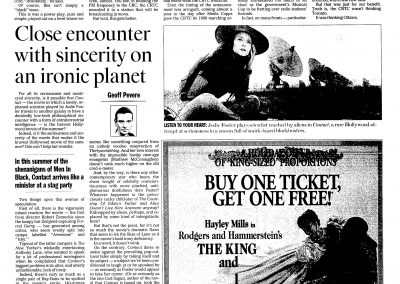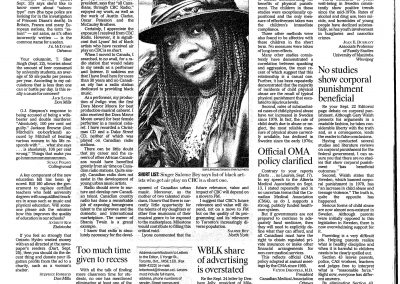THE MOVEMENT
/ˈmo͞ovmənt/: 1. a principal division of a longer musical work, self-sufficient in terms of key, tempo, and structure; 2. a change or developmentWhen it comes to genres like R&B and hip hop in Toronto, people in and out of the city’s music industry agree: the infrastructure isn’t there for black musicians in the city to succeed.
“I think urban music isn’t supported in the way that it should be supported,” says Kiana Eastmond. More often referred to as ‘rookz’, Eastmond is the owner and founder of Sandbox Studios.
Located appropriately in Toronto’s studio district, Sandbox Studios is an artist development space that offers services in photography, video and, of course, audio recording. It was founded in 2013 with Eastmond at the helm as the executive producer.
Because of her personal affinity to R&B and hip hop, she says Sandbox tends to lean towards artists that work within those genres, but they also focus on “anything that’s not folk or rock or whatever’s really supported in Canada.”
Creating Sandbox, she says, was an attempt to make music a less “political space” and more of an open arena to allow for exploration. It’s where the name “Sandbox” comes from. “I wanted it to be a space where anybody could come at any skill level, do anything and we were going to bring what we knew about music and bring that to that artist,” says Eastmond.
Last year, she was appointed executive director of Manifesto, the organization behind one of Toronto’s biggest arts and culture festivals which will take place at city hall in August 2019.
Having built a name for herself in Toronto’s music scene, Eastmond says that there isn’t much in the way of support there for black musicians. She doesn’t think, however, that the responsibility falls to the government to establish an institution for black artists. It’s a cause, she believes. that needs to be taken up by the people within the black music scene in the city.
One challenge she notes were the “gatekeepers” who have sat in the upper echelons of music in Toronto over the course of a dramatic shift in the sound. She’s also been surprised at the less-than-warm reception from black people within the music industry.
“As a black music person, my expectation is that the black music people ahead of me are supportive in helping create an opportunity for me to grow myself and my business,” she says. “I’ve found that’s been the exact opposite in my experience of working in music.”
Eastmond says she’s had people outside of black music and her culture to thank for her success.
As a Jamaican woman, she says, the dynamic she’s seen in the city’s music spaces where the “older heads” don’t support the “younger heads” goes back to issues that exist within Caribbean community.
“The Caribbean narrative, whether people want to acknowledge it or not, is that our parents come from a lot of negative relationship habits and we’re going to see those things transfer over in business,” says Eastmond. “When you talk to a lot of people in the urban music industry, they don’t like each other. Ask anybody about anybody else.”
Tension within interpersonal relationships of Caribbeans specifically isn’t well studied, but it was explored in a paper in the International Journal of Sociology and Anthropology in 2017. The paper looked at how differences in “socio-political histories, values, norms and social arrangements” manifest in Caribbean couples as points of conflict. The research found that strict adherence to traditional gender roles between men and women that play out because of religions beliefs and economic hardships played a significant role in the overall dissatisfaction in the relationships of Caribbean couples in Jamaica and Guyana. “We’re Caribbean kids. We’re going to have Caribbean habits. The examples are dysfunctional relationships and a lot of business requires trust,” she says.
Eastmond says the music industry needs to get past the “petty stuff” to make something that’s truly collaborative.
The notion that being black and working within certain genres in Toronto is a barrier to success is not universally believed. Trés-Von Carimbocas, for one, disagrees.
“I think I have an upper hand,” he says.
He explained that while growing up, he was surrounded by affluent white kids who attended the same school as him. It left him feeling as though being white would be “more convenient and easy.”
“You want to blend in more when you’re younger. You don’t see the value in your uniqueness,” says Carimbocas.
His opinion changed when he started to get attention from young women
“I noticed me and the other black kid that came to my school that year, all the girls liked us more than everyone else. The white girls, the black girls, the asian girls, it didn’t matter,” he says. “I started to notice that in other aspects in life. I said ‘What is it about us?’”
He went on to talk about a certain “coolness” that the black community has capitalized on when it comes to art and music
“I feel like no one expresses themselves the way that black people do and I think that black people are the only people who have been able to literally infiltrate every genre,” he says.
New black artists may also have to contend with opposition from music venues in the city who may not be open to genres like hip hop. It’s something that Brenden Hewko has had experience with when it comes to hip hop acts.
Hip hop culture is something Hewko has immersed himself in.
“I was that white kid in Grade 3, Grade 4 wearing Ecco and Phat Farm and that kind of stuff. I had my little chains and my spiked hair,” Hewko says. “I remember buying DMX’s It’s Dark and Hell is Hot and having my mom … come into the record store and authorize me buying it because it had explicit lyrics and parental advisories on it.” Hewko moved on to what he calls a “skater phase” in his teens where he leaned towards bands like Slipknot and Three Days Grace.
But he eventually found himself back in arms of his first musical love. Now, Hewko runs Smashmouth Entertainment, an event production and artist booking agency.
Hewko created Smashmouth almost 10 years ago while he was a business student at Western University. While living in London, Ont., he felt a lot of the live music in the city was “all EDM/House bullshit” so he began to promote and book little-known hip hop artists at venues in London.
Hewko now lives in Toronto and over the past decade, he’s brought hip hop to venues in the city. “Individuals like Kendrick Lamar, SchoolboyQ, Ab-Soul, A$AP Rocky, A$AP Ferg, Joey Bada$$, The Underachievers … Mac Miller, Post Malone, Big Krit, 6lack, all of those are artists that I brought to Canada, and to Toronto more specifically, for the first time,” he says.
Hewko added that he’s worked with “every venue in Toronto” both large and small. He considers it a blatant act of racism when venues refuse to book hip hop acts. That’s what happened with one of his own shows.
In 2013, Hewko had a NXNE showcase booked at Rivoli, a restaurant/pool hall/concert venue combo in downtown Toronto. During the afternoon the day the performance was set, uniformed officers went into the venue and spoke to the manager, recommending an increase in security to mitigate the possibility of gang presence as a result of the show’s billing. The manager cancelled the show outright.
Hewko says he’s worked with the Rivoli’s management before and since then and views it as an “isolated incident.” It is an example, though, of a larger issue that has been a barrier for some black artists in the city. He says he sees the phenomenon happen most often with smaller venues, those that hold less than 200 people.
He chalks it up to a difference in culture, as most small venue owners are older and don’t have the greatest opinion of the hip hop crowd. “I’ve had smaller venues ask questions like ‘Before I give you a price, can you tell me what genre it is or who the artists are?’ Which comes across, obviously, as them structuring their price on the type of music,” Hewko says. “Should that be taken into consideration? Probably not, but … it’s something I’ve learned to accept.”
The venue issue was explored last year by Lidia Abraha in an article in NOW Magazine in Toronto that discussed the contrast between the popularity of hip hop against the “small venue crisis” that has left local hip hop artists with fewer and fewer spaces to showcase their music. Abraha, a journalism student from Ryerson University, says that push-back from venues owners when it came to hip hop was “pure racism.”
“You don’t like large groups of black people. That’s what you’re telling me,” says Abraha.
She was shocked, she says, to discover that despite Toronto’s growing international presence in hip hop, there were still barriers facing local artists. “I couldn’t believe that in a city like Toronto where we have Drake, we have PARTYNEXTDOOR, The Weeknd — all these big, big hip hop stars that are making international waves, yet locally in the city we don’t even have the support to bring up those artists and to make more of the Drakes, of the Tory Lanezes,” she says. “I think black people in Toronto face barriers in all kinds of ways and music is just one of them.”
Erin Ashley’s writing career started 10 years ago in the world of online blogging. She’s now the hip hop editor for Exclaim! Magazine. “It’s Canada’s national music publication,” says Ashley. “And it’s the only dedicated one left.”
Ashley also has concerns about the lack of infrastructure for black music. She says the current music framework in the city is “not necessarily helpful” to genres like rap, soca, R&B, reggae and dancehall. “We’re like a budget version of the States when it comes to an infrastructure that works,” says Ashley.
Like Eastmond, she thinks it comes down to the fact that music executives in the city come from a time when rock was the sound of the day and may not be receptive to black genres. “There’s a lot of … people who were there in the 90s enjoying the rock and roll that are still in positions of power today and don’t see the benefits of a rap song that’s coming out or an R&B song that’s making waves,” she says.
Despite the disconnect between today’s popular music and interest from those with power in the music industry, Charles Jones says that any struggles black artists in the city may face are not for lack of appreciation of genres like hip hop and R&B.
“Toronto may be a white-bread city but you’ll find that everybody loves Motown,” says Jones. A part of the problem, in his estimation, goes back to the points Ashley and Eastmond made about few black people in senior positions in the music industry. Jones is also concerned about navigating those spaces in the city without the access to ways to promote the music.
He cited radio as being a particularly weak avenue for getting Canadian black music to the mainstream. It’s not easy to do with a city full of rock radio stations, he says. “We’ve got one R&B station in the city. It used to be owned by blacks. Now it’s owned by whites.” Jones is talking about FLOW 93.5 FM.
FLOW, or CFXJ-FM, was a property of Milestone Radio, a Toronto-based radio broadcasting company owned by Denham Jolly, a Jamaican businessman. Jolly first applied to the CRTC for an urban music station in 1989 but was passed over for a country music station, CISS, now known as KISS 92.5.The CRTC decision in 1990 stated that while the Commission was sensitive to the needs of multicultural groups in the city, its view was “that many of the plans proposed by the Black or Dance applicants, particularly with respect to the musical programming, may be accommodated by existing Toronto radio stations. The Commission notes that Dance music material is currently available through a number of Toronto stations.” The CRTC passed over FLOW again in 1997 when the CBC wanted to move its Radio One station in Toronto from AM to FM.
Both decisions were seen as controversial. Royson James, a former Toronto Star columnist, called the decision “awful” in a op-ed he wrote in August 1997. “The message is: Just go away, plan your little dances and street parties and once-a-year Caribana, if you can manage that, and don’t bother us,” James wrote.
In 2000, the CRTC opened applications for a new station once again and FLOW was finally accepted. The first song played was Roots, Rock, Reggae by Bob Marley in 2001. Milestone was bought by CHUM Radio, a division of Bell Media Radio, in 2011.
It is now owned by Stingray Group, a Montreal-based media and entertainment company. Stingray, originally founded in 2007, is owned by Eric Boyko.
FLOW described itself as “Canada’s first and only hip-hop radio station” in a relaunch earlier this year. From 2016 until 2018, the station was called The Move and it played hip hop from the 80s, 90s and 2000s. The relaunch was less a complete overhaul of the station’s branding and more a move back to its original format.
FLOW’s ownership is something Jones believes works to the station’s detriment. He says there is a disconnect in understanding black genres of music between the artists and executives who are largely white. Ultimately, he doesn’t think that black music has the support in Toronto it needs.
“You’re not going to get a Beyoncé out of Canada no matter how much you try because they won’t give us that kind of attention,” says Jones. “You have to build them up first.”
